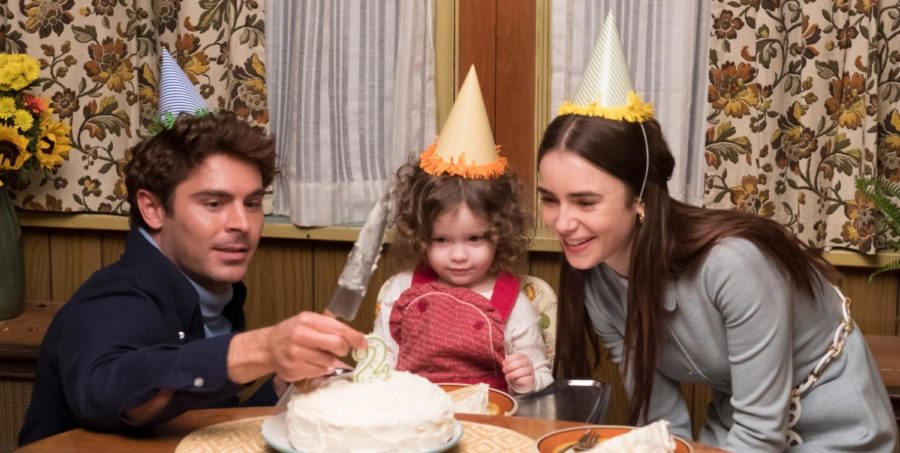Opinion: Ted Bundy should stay dead
In this photo made available by the Sundance Institute, Zac Efron and Lily Collins appear in “Extremely Wicked, Shockingly Evil and Vile,” directed by Joe Berlinger, an official selection of the Premieres program the 2019 Sundance Film Festival. The movie and a new Netflix documentary series have stirred up complicated reactions to the handsome former law student who is believed to be responsible for killing at least 30 women and girls in a multiple-state spree that ended 41 years ago with his arrest. (Brian Douglas/Sundance Institute via AP)
February 24, 2019
Almost 50 years after he was caught by police for the rape and murder of dozens of women, Ted Bundy continues to enjoy a celebrity level of fame, complete with a Netflix documentary series about his life and an upcoming movie in which he’s being portrayed by Hollywood heartthrob Zac Efron. I use the word “enjoy” because, according to one of his survivors Kathy Kleiner Rubin in an interview, this sort of celebrity status is exactly what the killer would have wanted.
By many accounts, Bundy was a man with an inflated sense of self worth, a man with an ego who spoke in the third person and truly thought he was special. I know all of this because the documentaries, interviews, movies and articles about him have kept his life well-documented. I’d reckon that most people could tell you more about his life than the lives of the men who were president when he was killing.
The media helped Bundy become the mythological figure that he always saw himself, and they awarded him this celebrity because he was a killer. And letting people know that his path is one to fame is a dangerous message to send.
Professor of forensic psychology at DeSales University Katherine Ramsland wrote in an article for Psychology Today that “the more celebrity a serial killer attains, the more attractive he is to copycats.” She notes that not only does this provide future killers an opportunity to study their predecessors mistakes, their “boldness” can be empowering.
Now, at the time of writing, the new Ted Bundy film hasn’t yet been released to general audiences so it’s difficult to tell in exactly what light the movie intends to portray the killer. However, the trailer has already come under fire for featuring Zac Efron winking at the camera and jumping out of buildings like an action hero to the backing of a hard rock soundtrack. The trailer makes his story look exciting and interesting. That’s because it is.
It’s no secret that bad news gets more attention than good news. People can’t look away from car wrecks because they aren’t what you see on the average day. That’s the kind of story that makes the news. That’s the kind of thing they make movies about. It’s not realistic to call for a blackout on bad news or to say that there should never be a movie made about a tragedy again. It’s not realistic to expect people to not be interested in these sort of stories because these stories aren’t the average. They’re interesting.
However, there’s a line between documenting and glamorizing. Early viewers have criticized Efron’s new movie for overly romanticizing Bundy and for not paying enough attention to his victims who, as writer Ashley Alese Edwards noted, are still being portrayed as side characters in his story. It’s been heavily publicized that Efron is playing the lead role. I don’t know that I could name a single person playing one of his victims. And maybe it’s a little distasteful to imply that if you commit a heinous enough crime, your story might make its way to the big screen to be told by a handsome Hollywood actor.
It’s not that the public shouldn’t be educated about the criminal mind and the red flags that come with it. And it’s not to say that there’s anything wrong with being interested in topics like this. But research shows that it’s important to tell these stories in a way that doesn’t glamorize these kinds of people so as not to build them up as mythological villains in the vain of Hannibal Lector or Dexter Morgan.
Because when it comes down to it, despite the grandiose way that many serial killers see themselves, they’re usually not exceptional people. They’re not the average person. But they’re also “losers,” according to writer Joel Achenbach.
“Real life is not so gothic. When police bag a serial killer, he is usually a weak man, cowardly, not terribly savvy and a failure at most everything he’s ever done in life. He’s a loser,” Achenback wrote in a 1991 Washington Post article.
Media that depicts them as anything other than that is not only distasteful and dishonest, it could send the wrong sort of message to those with the same delusions of grandeur.








